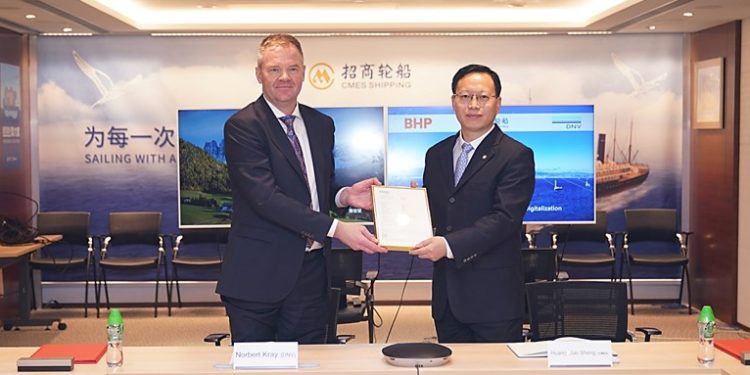China Merchants Energy Shipping (CMES), BHP and DNV signed a Memorandum of Understanding (MOU) to collaborate on industry value chain greenhouse gas (GHG) management.
As the maritime industry is undergoing major transformations driven by the twin ambitions of carbon emissions reduction and digitalization, the MOU seeks to enable close cooperation between ship owner and charterer with the aim of achieving further energy efficiencies and GHG savings through improved voyage data collection, verification and sharing via DNV’s Veracity data platform in collaboration with the industry partners’ digital management systems.
For this reason, CMES, BHP and DNV have started their first joint pilot project, which focuses on the exchange and analysis of quality-assured data from selected ships and voyages.
The first-ever Voyage GHG Verification Statement was issued by DNV as part of the pilot project, with the goal of establishing a trusted common source of data truth for use in various current or potential future business scenarios such as:
- Scope 1 (ship owners) and Scope 3 (charterers) emissions reporting,
- Carbon trading and taxation settlement,
- GHG emissions compliance and improvement (e.g. CII and EEXI),
- Fuel usage and GHG emissions reductions.
It is expected that shipowners and charterers who work closely together may be able to reduce operational emissions by up to 15% by sharing data and insights compared to cases where there is little practical cooperation.
To master the industry’s challenges of tomorrow all parties across the value chain must come together on a trusted basis and establish a common source of data truth
said Huang Mao Sheng, Vice President of CMES.
As for Rashpal Bhatti, Vice President of Maritime and Supply Chain Excellence, BHP, he noted that “vessel owners who are early adopters of cross-value chain data sharing will likely have an advantage among charterers like BHP who have set targets for GHG emissions reductions and have the tools to help them assess, analyse, benchmark, and measure GHG emissions reportable within Scope 3.”
































































thanks for info